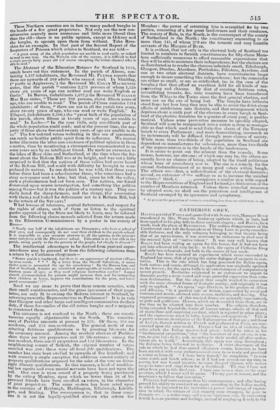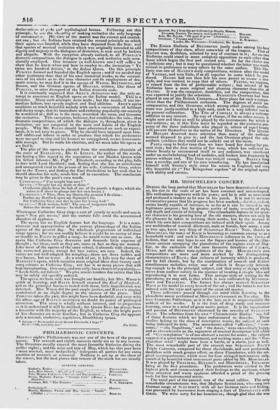CATHERINE GREY.
Havixc got rid of PASTA and quarrelled with Senno:Demllanager IluNg transferred to Mrs. Wool) the laudatory epithets which, in turn, had been applied in his play. bills to those eminent singers ; and BALFE, fora week, took the place of BEETHOVEN. The sudden disappearance of the Continental stars left the hemisphere of Drury Lane in pretty consider- able darkness, and the only company belonging to that theatre being that of an opera-house, it was necessary to endeavour to shed over it the musical light of "native talent." It was very well known that BALFE had been writing an opera for this house, but it had not been put into rehearsal till very lately: in faet, the opera of Catherine Grey bad only two rehearsals, and both in the course of last week. BALFE has here repeated an experiment which never succeeded in England but once, that of giving the entire dialogue of an opera in reci- tative. This is the rule which has long governed the Italian opera, both serious and comic, although its application was originally confined to the former ; for the opera buffa is an entertainment of comparatively recent growth. Recitative originated in an endeavour to impart to dramatic poetry a more varied and more powerful expression than eons- mon declamation. But the object thus sought implied its connexion with the more elevated forms of dramatic poetry ; and originally it was only so applied. " An opera," says Davin:si, in his preface to Albion and Alban ins, "is a poetical tale or fiction, represented by vocal and instrumental music, adorned with set-uses, machines, and dancing. The supposed personages of this musical drama are generally supernatural, as gods and goddesses. Heroes, which are descended from them, are in due time to be adopted into their number. The subject, therefore, being extended beyond the limits of human nature, admits of that sort of marvellous and surprising conduct, which is njected in other plays ; and the expressions must be lot ty, fignrative, find inajestical.'"fhis is a pretty accurate description of the Italian operas of ilia age ; and those of 1.111.s, though written in French and pelformed at Paris, are con- structed upon the same model. I /RYDEN had no idea of viaiting the rules which the Italian masters kid given : indeed he takes as his " fundamental proposition," that " the inventors of any art a re, in rea- son, to give laws to it ; and, according to their model, all after-under- takers are to !mild." Areordingly, this opera was sung throughout ; the dialogue beiog delivered in reritative. A strict obscreaece of the rule to which he hod thus vowed allegiance seems, however, to have been attended with some embarrassment even to so ready and practised a writer M himself. " I have been forced," he complains, " to coin some words and botch others; as if I had not served out my time in poetry, hut was bound 'prentice to some do.zgrel rhymer, who makes songs to tunes and sings them for a livelihood. 'Tis true I have not often been put to this drink.Try. I have now been a slave to the com- position, which I never will be again. 'Tis my part to invent, and the musician's to follow that PURCELL had more courage than his contemporary ; and after having proved iris ability to construct an opera aceordiug to the Italian model, in which be imparted to his redtatives a power and energy of expres- sion to which the writers of iliat country were strangers, be gave to dramatic me 4. a wider scope and a more vigourons Min, by coneeeting it with haman passions and feelings, instead of employing it only in the declainath es of 1.-,.44 renA mythological heroes. Following out this
principle, h. v the Lbsardity of making recitative the only language
of conversatiar. Hi+ view ot the matter was the correct and consist- ent one ; hut ln Italians have retained the second principle on which their opera waa founded, while they have departed from the first: and that species of musical recitation which was originally intended to add dignity and majesty to the dialogues of divinities, is now used by lackies and abigails. With the exception already noticed, in all PURCELL'S &emetic compositions the dialogue is spoken, and recitative only occa- sionally employed. One instance (a well-known one) will suffice to show that he knew when and bow to employ it—the invocation" Ye twice ten hundred deities," in the Indian Queen. On this principle PURCELL formed and founded the English opera ; and if we needed any other testimony than that of his own immortal works, to the correct- ness of his views as to the true character and tit employment of dra- matic music, we may find it in the operas of Wenen, BEETHOVEN, and SPOIIR, and the German operas of MOZART, written, like those of Petecea.t., in titter disregard of the Italian dramatic code. It is commonly supposed that ARNE'S Artaxerxes was the only at- tempt to construct an English opera on the Italian model. This is a mistake. Many such attempts were made ; but the result, if not im- mediate failure, was speedy neglect and final oblivion. ARNE'S opera combines so much beautiful melody with such a succession of brilliant and showy songs, that its immediate and enduring popularity can scarcely be wondered at ; dull as is the story, wretched the verse, and tiresome the recitative. This exception, however, but establishes the rule—that dramatic compositions, of which the dialogue is, throughout, given in recitative, are not congenial to the taste and habits of the English people. Why Mr. BALI% should have adventured on such an experi- ment, it is not easy to guess. Why he should have imposed upon him- self additional labour in order to produce that which his performers were unequal to sing and his hearers to coinnehend, seems unaccount- able enough. But he made his election, and we must take his opera as 'we find it.
The plot of the opera is gleaned from the scandalous chronicle of the court of ELIZABETH ; Mr. G. LINLEY, the author of the words, not having a like regard to the reputation of our Maiden Queen with his fellow labourer Mr. _MO:* Elizabeth, according to the play, fulls in love with Lord Hertford ; and. finding that she has an unwelcome and unexpected rival in the person of his wife, Catherine Grey, orders bet to the Tower, and finding the Earl disobedient to her wish that he should abandon his wife, sends him off to execution. The conclusion may be given in the poet's own words.
CAVIL RI s E—" Can nought him save?" Qe vs: 1.4—"Nought hut may death or thine." (Catherine plucks from the belt of one of the guards a dagger, which she raises as if about to plunge into her own breast.) CATHFRINE—" Thus, then, my Queen, thy promise I do claim :
Pardon my Hertford, spare my Seymour's life,
For Catherine Grey now dies to save her loving lord." (11: EE •i—'. U Al woman, hold ! The arm of vengeance falls
Before the shrine of mercy : lie shall live."
Whereupon Catherine Grey sings a sort of parody in words and music upon " Non pin mesta," and the curtain fells amid the accustomed thunders of applause.
The opera has no English feature but the language. It is a remi- niscence and appropriation of the current phraseology of the Italian operas of the present day. No wholesale plagiarisms of individual songs appear ; for we can readily believe it would be no saving of time ur trouble to BMA's to pilfer a song—he would write one as soon. An opera like Catherine Grey discovers and demands little expense of thought ; for ideas, such as they are, come as fast as they are wanted. Like most of the operas of the same school, it abounds with choruses; but concerted pieces, except for two voices, are rare. Indeed, the voices are not well adapted for mingling—there are three trebles and two basses, but no tenor. As a wotk of art, it falls very far short of BARNETT'S opera, which contains more original ideas than twenty such coin; asitions as Catherine Grey ; nor has it so many pieces that will bear transplanting. One song, and one only, has a chance of popularity,— " Look forth, my fairest." We give music-venders due notice that this nine be safely Ind speedily ordered. the opera, we have said, was brought out hastily; but Mrs. Wools is spaick at learning, and RAISE himself enacted the Earl of Hertford; and as the principal business rested with them, little imperfection was detected. Airs. Wool) did the part ample justice, and BA LF li'S singing
contributed in no slight degree to the success of the piece. Ilad Priitties taken the ran, this might have been doubtful, and even with the advai-age of &stye's *assistance we doubt its power of prolonged attraction. The story is wholly without interest, and in proportion
as it is understood it will be disliked ; for Queen BESS has always been a favourite with the majority of the English, to whom the bright parts of her character are most familiar ; but in Catherine Grey she appears only a sensual, vindictive, capricious, bloodthirsty tyrant.
SrrEurt—.. No scandal about Queen Elizabeth, I hope ?"
l'urv—" Oh, certainly nut." The Critic.



























 Previous page
Previous page